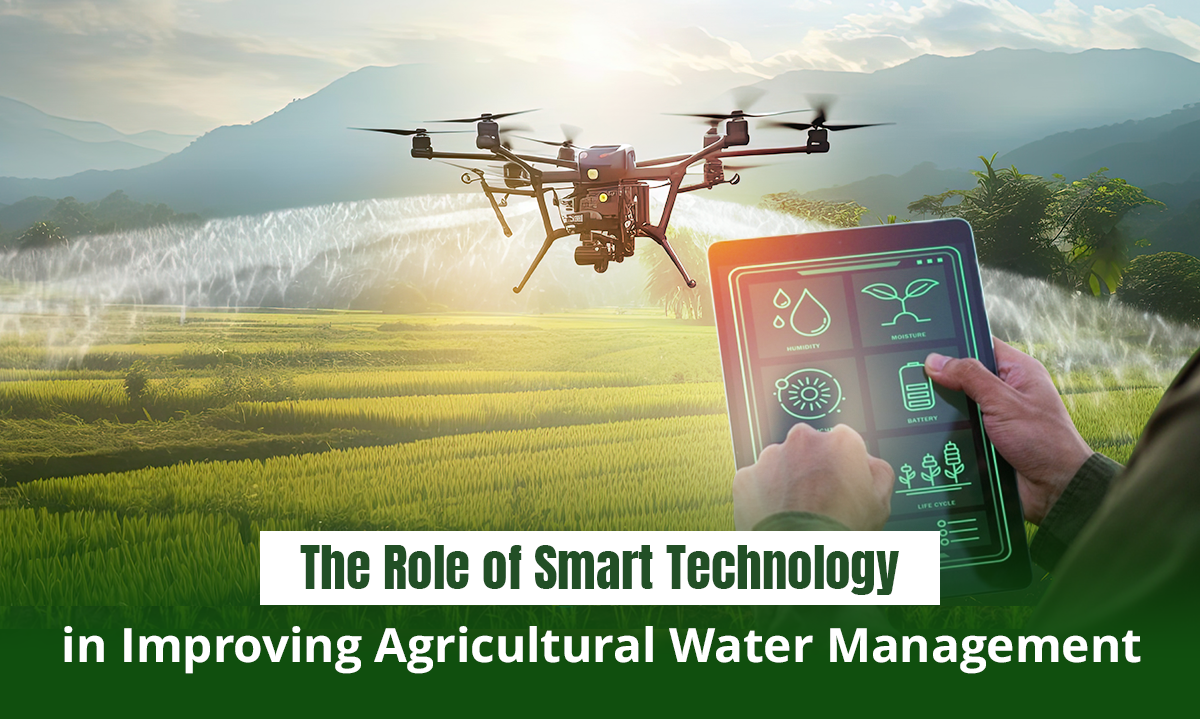Smart Solutions for Agricultural Water Use: A Sustainability Guide

Introduction
Sustainable water management in agriculture is essential for guaranteeing long-term productivity while conserving key water supplies. With global water scarcity becoming a growing concern, the agricultural sector must employ technology that improves water efficiency, reduces waste, and increases crop yields.
The Impact of Technology on Water Management
Modern technology is essential to increasing the efficiency of water use in all agricultural operations. Conventional irrigation techniques like surface and flood irrigation can result in excessive water waste, particularly in areas where water is already in short supply. However, farmers are now able to maximize water use thanks to creative solutions made possible by technological breakthroughs.
Systems for Drip Irrigation
Drip irrigation is one of the most important methods for managing water. Drip irrigation, on the other hand, sends water directly to the roots of plants, reducing waste and evaporation. This method precisely delivers water through a network of pipes, valves, and emitters. This can cut water use by up to 50%. Adding sensors to the system makes it simple to automate, which makes it even more useful. This technology has changed everything for farmers in dry areas because it lets them use less water while still keeping crops healthy and productive.
Smart systems for watering plants
Smart irrigation devices are revolutionizing farming by integrating technology and real-time data. To figure out how much water plants need, these systems use evapotranspiration data, weather forecasts, and sensors that measure soil wetness. Through technology, farmers can keep their fields from getting too much water, which can waste water and cause soil to wash away. Farmers can manage these systems remotely through mobile apps, enabling them to monitor water usage and make adjustments at their convenience.
Sensors for soil moisture
Earth moisture sensors tell you about the amount of water in the earth in real time. These tools help farmers figure out the best time to water their crops by telling them exactly when the soil is dry or wet. This prevents excessive water damage to crops and reduces water waste. Farmers can make sure that crops get water exactly when they need it by connecting these sensors to automatic irrigation systems.
Technology used in satellites and remote sensing
Farmers can monitor vast areas of agriculture using satellite technology and remote sensing, all from the comfort of their offices. Satellites can offer comprehensive information on water stress, crop health, and soil moisture levels. To examine the state of crops and soil, these technologies employ multispectral cameras, thermal imaging, and infrared. In order to minimize water waste, farmers can utilize this information to make well-informed decisions on crop care, insect control, and water usage.
Reusing water and collecting rainwater
Farmers use water recycling and rainwater harvesting to maximize water use. Rainwater harvesting is the process of collecting rainwater from roofs and other surfaces. You can store the water and use it for irrigation. This method makes it less important to use groundwater and open water. Water filtration systems enable farms to reuse water from various tasks, such as washing and watering crops, repeatedly, thereby reducing their overall water consumption.
Machine learning and artificial intelligence (AI)
Agricultural water management is increasingly utilizing AI and machine learning algorithms to more precisely forecast water requirements. To predict the need for irrigation, these systems examine enormous volumes of data from crop types, soil moisture, and weather patterns. By generating forecasts based on real-time data, AI-driven models assist farmers in optimizing their water usage and enhancing water conservation initiatives.
Effective systems for storing water
Farmers can store a lot of water during wet seasons for use during dry ones thanks to effective water storage devices like water tanks and smart reservoirs. These systems utilize sensors to monitor the water's quality and levels. Furthermore, automated systems have the ability to control water flow, guaranteeing a steady and dependable supply for crops.
Advantages of Water Management Driven by Technology
Using cutting-edge technology to manage water can help farmers in a number of ways.
Enhanced Water Efficiency: By ensuring that crops receive the appropriate amount of water at the appropriate time, technologies such as drip irrigation and smart sensors help to reduce water waste and increase crop yields.
Savings on costs: Farmers save money over time by using less water and increasing agricultural output, even if the initial investment in equipment can be substantial.
Sustainability: Water-saving and efficiency-boosting technologies support sustainable agricultural methods. Long-term agricultural success depends on the use of technology to conserve water, which is becoming a more precious resource.
Increased Productivity: Farmers benefit from healthier crops, larger yields, and more steady growth as a result of improved water management.
Conclusion
With creative ways to guarantee effective use of water resources, technology has the ability to completely transform sustainable water management in agriculture. Farmers may maximize their water use, preserve essential resources, and boost output by utilizing contemporary irrigation systems, sensors, artificial intelligence, and water recycling. Adoption of technology-driven water management solutions will be essential for maintaining food security and conserving water for future generations as the world's population continues to rise. Farmers can significantly contribute to the development of a more sustainable and water-efficient agricultural environment with sustained technology developments and assistance.
Latest blogs
JOIN OUR COMMUNITY !
Stay connected with Getfarms! Follow us on social media for the latest updates, exclusive offers, and a glimpse into the world of farmhouse living. Join our community today




























